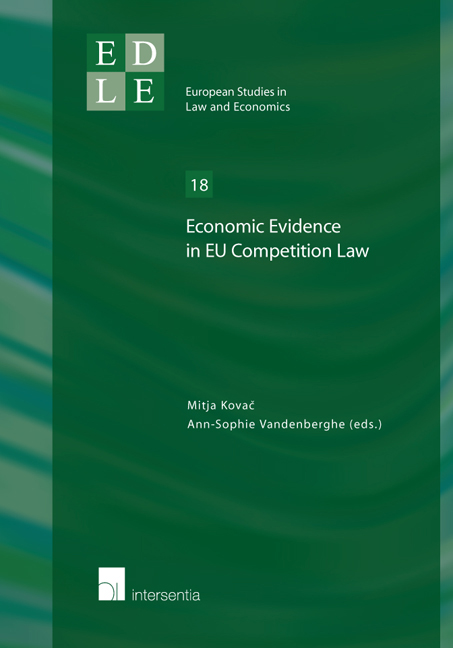Book contents
- Frontmatter
- Dedication
- Preface
- Contents
- List of Contributors
- General Introduction
- PART I ECONOMIC METHODS IN COMPETITION LAW
- Chapter 1 The More Economic Approach in European Competition Law: Is More Too Much or Not Enough?
- Chapter 2 The Value of Training in Quantitative Methods for Judges
- Chapter 3 Reliable Research Methods in Applied Econometrics for Competition Law
- PART II ECONOMIC EVIDENCES IN COMPETITION LAW
- PART III INSIDER TRADING, CARTELS AND CRIMINALISATION
- PART IV PRELIMINARY RULINGS AND STATE AID CONTROL
- PART V ECONOMIC EVIDENCE, ENFORCEMENT PROBLEMS AND NATIONAL COURTS
- Index
Chapter 2 - The Value of Training in Quantitative Methods for Judges
from PART I - ECONOMIC METHODS IN COMPETITION LAW
Published online by Cambridge University Press: 21 September 2018
- Frontmatter
- Dedication
- Preface
- Contents
- List of Contributors
- General Introduction
- PART I ECONOMIC METHODS IN COMPETITION LAW
- Chapter 1 The More Economic Approach in European Competition Law: Is More Too Much or Not Enough?
- Chapter 2 The Value of Training in Quantitative Methods for Judges
- Chapter 3 Reliable Research Methods in Applied Econometrics for Competition Law
- PART II ECONOMIC EVIDENCES IN COMPETITION LAW
- PART III INSIDER TRADING, CARTELS AND CRIMINALISATION
- PART IV PRELIMINARY RULINGS AND STATE AID CONTROL
- PART V ECONOMIC EVIDENCE, ENFORCEMENT PROBLEMS AND NATIONAL COURTS
- Index
Summary
INTRODUCTION
Judges face a significant skills gap that threatens to undermine their ability to properly adjudicate civil matters. Although modern disputes frequently involve decisions that hinge on quantitative or theoretically sophisticated economic evidence, few judges have backgrounds sufficient to prepare them for these decisions. Courses on statistics, economics, and finance are almost entirely absent in legal education programs even though judicial analysis of these matters affects untold resources throughout the world on a daily basis.
With few exceptions, the individuals who sort into law do not have scientific or quantitative backgrounds. In the US, the majority of law school applicants have undergraduate degrees in the humanities and the non-quantitative social sciences. In most of the rest of the world, where law is a first degree, the situation is likely even worse. Judges are not unaware of this problem. Tasked by the Supreme Court with serving as the gatekeeper with respect to scientific evidence, the 9th Circuit opinion in the follow up to Daubert laments: “As we read the Supreme Court's teaching in Daubert, therefore, though we are largely untrained in science and certainly no match for any of the witnesses whose testimony we are reviewing, it is our responsibility to determine whether those experts’ proposed testimony amounts to ‘scientific knowledge,’ constitutes ‘good science,’ and was ‘derived by the scientific method.’”
In a presentation at the 2008 symposium “The Supreme Court and Useful Knowledge”, Linda Greenhouse, the Pulitzer Prize winning reporter who covered the Supreme Court for the New York Times from 1978 to 2007, concluded “A good judge is not necessarily one who knows everything, but one who is willing to learn.” Presumably judges do want to get these issues “right”, and while most are likely willing to learn4, at least in theory, reality often gets in the way.
Given the demands placed upon judges in most jurisdictions, it is unlikely they will have resources or the inclination to remedy this shortcoming despite recognising the problem, especially in an environment where the remuneration of judges appears to fall short of compensating them for doing even the bare minimum.
- Type
- Chapter
- Information
- Economic Evidence in EU Competition Law , pp. 43 - 50Publisher: IntersentiaPrint publication year: 2016



